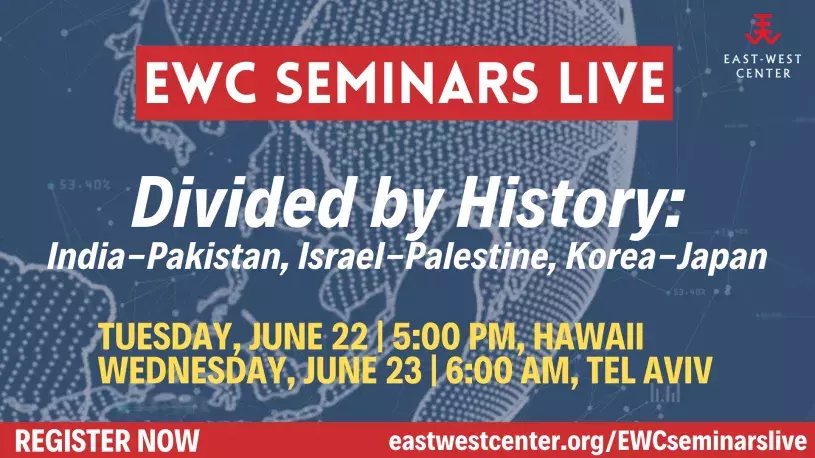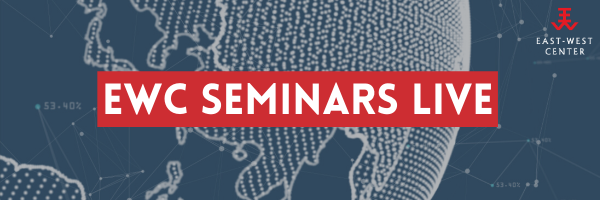Error message


Divided by History: India-Pakistan, Israel-Palestine, Korea-Japan
Journalists share challenges of reporting cross-border conflicts
Tuesday, June 22 | 5:00 - 6:30pm, Hawaii *
Time Zone Converter
REGISTER NOW!
Long-running security and trade conflicts across tense, often hostile borders endanger lives and cause economic hardships for countless millions in Asia, the Middle East and Africa. When these conflicts erupt and dominate headlines, journalists on both sides of volatile borders face challenges in reporting balanced, objective and fully covered stories.
In South Asia, the post-WWII partition of British India creating Pakistan led to 15 million people moving -- Muslims to Pakistan, Hindus and Sikhs to India -- and 500,000 to 2 million deaths in the ensuing violence. Territorial disputes against Indian rule in the Kashmir region have endured for three decades, claiming tens of thousands of lives in an often violent environment between the two nuclear-armed neighbors. Cross-border trade is difficult if not impossible.
In the Middle East, the conflict over a Palestinian homeland is again dominating global headlines. Protests sparked by the threatened eviction of Palestinians from East Jerusalem led to Hamas launching missiles into Israel, then an Israeli air bombardment and ground artillery attack on Gaza. The recent death and destruction have further deepened humanitarian challenges in Gaza. The long-running violence has threatened generations of Palestinians and Israelis with no peaceful resolution in sight.
In Northeast Asia, the Japanese occupation of the Korean Peninsula from 1910-1945 continues to drive tensions between Japan and South Korea that started earlier in history. A South Korean court ruling that survivors of Koreans forced to labor for Japanese corporations during World War II could sue those companies has increased bilateral tensions in recent years. The two countries are also locked in a territorial dispute over a group of islands claimed by both in the Sea of Japan (called the “East Sea” by Koreans).
For journalists covering cross-border conflicts and disputes, presenting balanced coverage with diverse perspectives is not only professionally challenging, this can sometimes threaten their personal safety and security, especially with the rise of misinformation and conspiracy theories. For the last 20 years the East-West Center has engaged journalists in a series of programs that focus on reporting cross-border issues of mutual, often sensitive and volatile concern to countries in the region. These cross-border media programs include reporting trips, dialogues and workshops to provide first-hand information, build sustained information networks, and encourage media collaboration. Hear from prominent reporters about how they navigate the challenges of accurately reporting on the politically and socially fraught foreign relationships and enduring conflicts between India and Pakistan, Israel and Palestine, and South Korea and Japan.
Speakers: (listed in alphabetical order)
- Khaldoun BARGHOUTI, Israeli Affairs Editor, Al-Hayat al-Jadida, Ramallah, Palestine @KHBarghouti
- Aditi PHADNIS, Consulting Political Editor and former National Political Editor, Business Standard, New Delhi, India
- Shira RUBIN, Israel/Palestinian Territories Correspondent, The Washington Post, Tel Aviv, Israel @shira_rubin
- Taketsugu SATO, Senior Foreign Affairs and National Security Correspondent, The Asahi Shimbun and Visiting Professor, University of Tokyo, Tokyo, Japan @Taketsugu_Sato
- Kamal SIDDIQI, Director, Center for Excellence in Journalism at IBA and former Editor, The Express Tribune, Karachi, Pakistan @Tribunian
- Son Taek WANG, Research Associate, Yeosijae (Future Consensus Institute) and former Diplomatic Correspondent, YTN News Network, Seoul, South Korea @woovovo
Moderator:
- Owen ULLMANN, Executive Editor, The International Economy magazine and former Managing Editor of World News, USA Today, Washington, DC, USA @OUllmann
To register, visit www.eastwestcenter.org/EWCSeminarsLive
* June 23, 2021 | 12:00pm, Seoul, Tokyo | 8:30am New Delhi | 8:00am Islamabad | 6:00am Jerusalem

Divided by History: India-Pakistan, Israel-Palestine, Korea-Japan
Journalists share challenges of reporting cross-border conflicts
Tuesday, June 22 | 5:00 - 6:30pm, Hawaii *
Time Zone Converter
REGISTER NOW!
Long-running security and trade conflicts across tense, often hostile borders endanger lives and cause economic hardships for countless millions in Asia, the Middle East and Africa. When these conflicts erupt and dominate headlines, journalists on both sides of volatile borders face challenges in reporting balanced, objective and fully covered stories.
In South Asia, the post-WWII partition of British India creating Pakistan led to 15 million people moving -- Muslims to Pakistan, Hindus and Sikhs to India -- and 500,000 to 2 million deaths in the ensuing violence. Territorial disputes against Indian rule in the Kashmir region have endured for three decades, claiming tens of thousands of lives in an often violent environment between the two nuclear-armed neighbors. Cross-border trade is difficult if not impossible.
In the Middle East, the conflict over a Palestinian homeland is again dominating global headlines. Protests sparked by the threatened eviction of Palestinians from East Jerusalem led to Hamas launching missiles into Israel, then an Israeli air bombardment and ground artillery attack on Gaza. The recent death and destruction have further deepened humanitarian challenges in Gaza. The long-running violence has threatened generations of Palestinians and Israelis with no peaceful resolution in sight.
In Northeast Asia, the Japanese occupation of the Korean Peninsula from 1910-1945 continues to drive tensions between Japan and South Korea that started earlier in history. A South Korean court ruling that survivors of Koreans forced to labor for Japanese corporations during World War II could sue those companies has increased bilateral tensions in recent years. The two countries are also locked in a territorial dispute over a group of islands claimed by both in the Sea of Japan (called the “East Sea” by Koreans).
For journalists covering cross-border conflicts and disputes, presenting balanced coverage with diverse perspectives is not only professionally challenging, this can sometimes threaten their personal safety and security, especially with the rise of misinformation and conspiracy theories. For the last 20 years the East-West Center has engaged journalists in a series of programs that focus on reporting cross-border issues of mutual, often sensitive and volatile concern to countries in the region. These cross-border media programs include reporting trips, dialogues and workshops to provide first-hand information, build sustained information networks, and encourage media collaboration. Hear from prominent reporters about how they navigate the challenges of accurately reporting on the politically and socially fraught foreign relationships and enduring conflicts between India and Pakistan, Israel and Palestine, and South Korea and Japan.
Speakers: (listed in alphabetical order)
- Khaldoun BARGHOUTI, Israeli Affairs Editor, Al-Hayat al-Jadida, Ramallah, Palestine @KHBarghouti
- Aditi PHADNIS, Consulting Political Editor and former National Political Editor, Business Standard, New Delhi, India
- Shira RUBIN, Israel/Palestinian Territories Correspondent, The Washington Post, Tel Aviv, Israel @shira_rubin
- Taketsugu SATO, Senior Foreign Affairs and National Security Correspondent, The Asahi Shimbun and Visiting Professor, University of Tokyo, Tokyo, Japan @Taketsugu_Sato
- Kamal SIDDIQI, Director, Center for Excellence in Journalism at IBA and former Editor, The Express Tribune, Karachi, Pakistan @Tribunian
- Son Taek WANG, Research Associate, Yeosijae (Future Consensus Institute) and former Diplomatic Correspondent, YTN News Network, Seoul, South Korea @woovovo
Moderator:
- Owen ULLMANN, Executive Editor, The International Economy magazine and former Managing Editor of World News, USA Today, Washington, DC, USA @OUllmann
To register, visit www.eastwestcenter.org/EWCSeminarsLive
* June 23, 2021 | 12:00pm, Seoul, Tokyo | 8:30am New Delhi | 8:00am Islamabad | 6:00am Jerusalem






